400837 Health and Socio-political Issues in Aged Care Essay - WSU 2019
VerifiedAdded on 2022/11/18
|16
|4680
|384
Essay
AI Summary
This essay delves into the multifaceted aspects of palliative care within residential aged care settings. It begins by defining palliative care and its role in improving the quality of life for elderly patients facing life-threatening conditions, emphasizing its integration with curative treatments. The essay then critically examines advanced care directives, explaining their purpose in allowing patients to express their preferences regarding end-of-life care, and discussing their benefits in reducing conflicts and stress. Furthermore, it explores the legal and ethical considerations associated with advanced care directives, including potential legal challenges, the impact on life insurance policies, the debate surrounding withholding treatment, and ethical dilemmas faced by healthcare providers. Finally, the essay proposes strategies to enhance the provision of palliative care in residential aged care, offering a comprehensive overview of the subject matter.
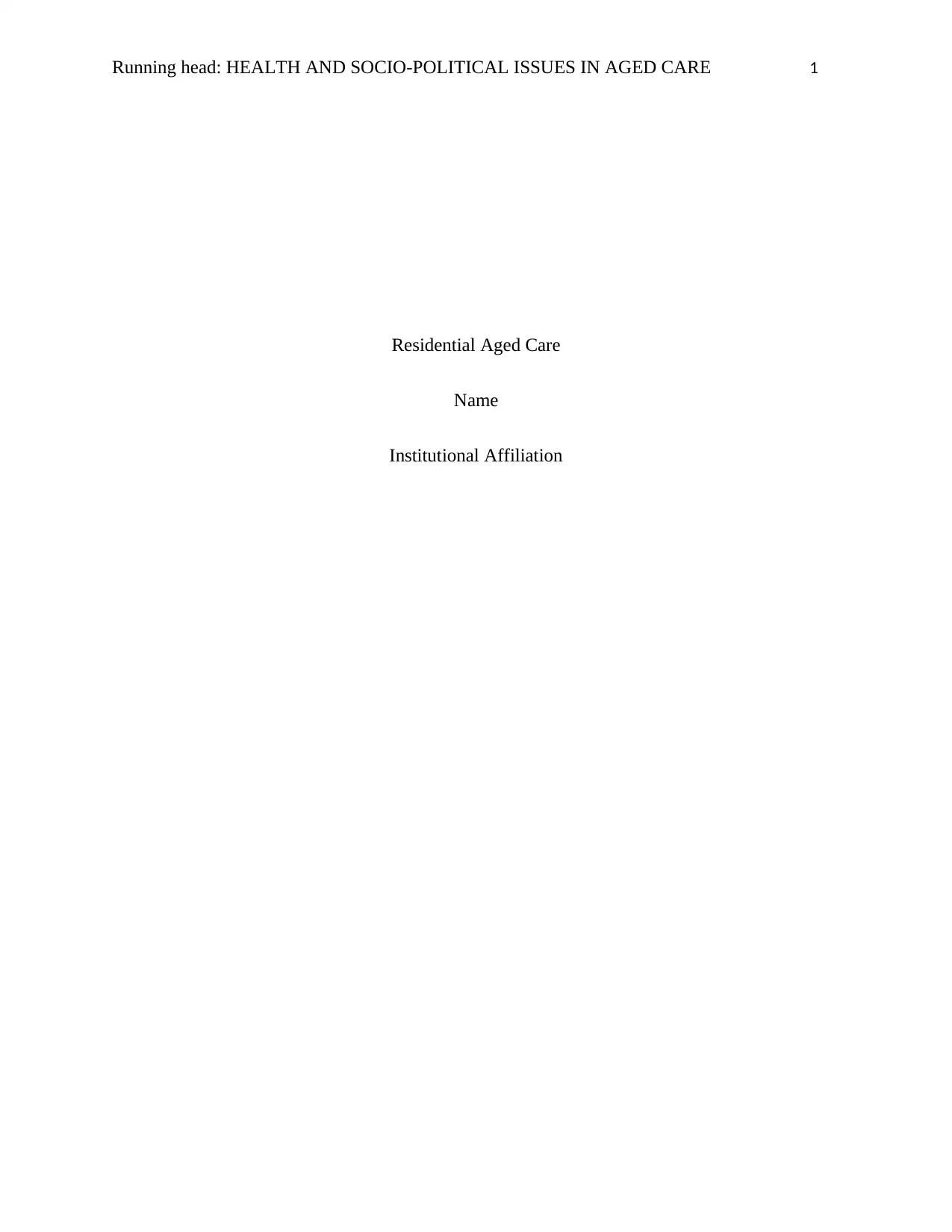
Running head: HEALTH AND SOCIO-POLITICAL ISSUES IN AGED CARE 1
Residential Aged Care
Name
Institutional Affiliation
Residential Aged Care
Name
Institutional Affiliation
Paraphrase This Document
Need a fresh take? Get an instant paraphrase of this document with our AI Paraphraser
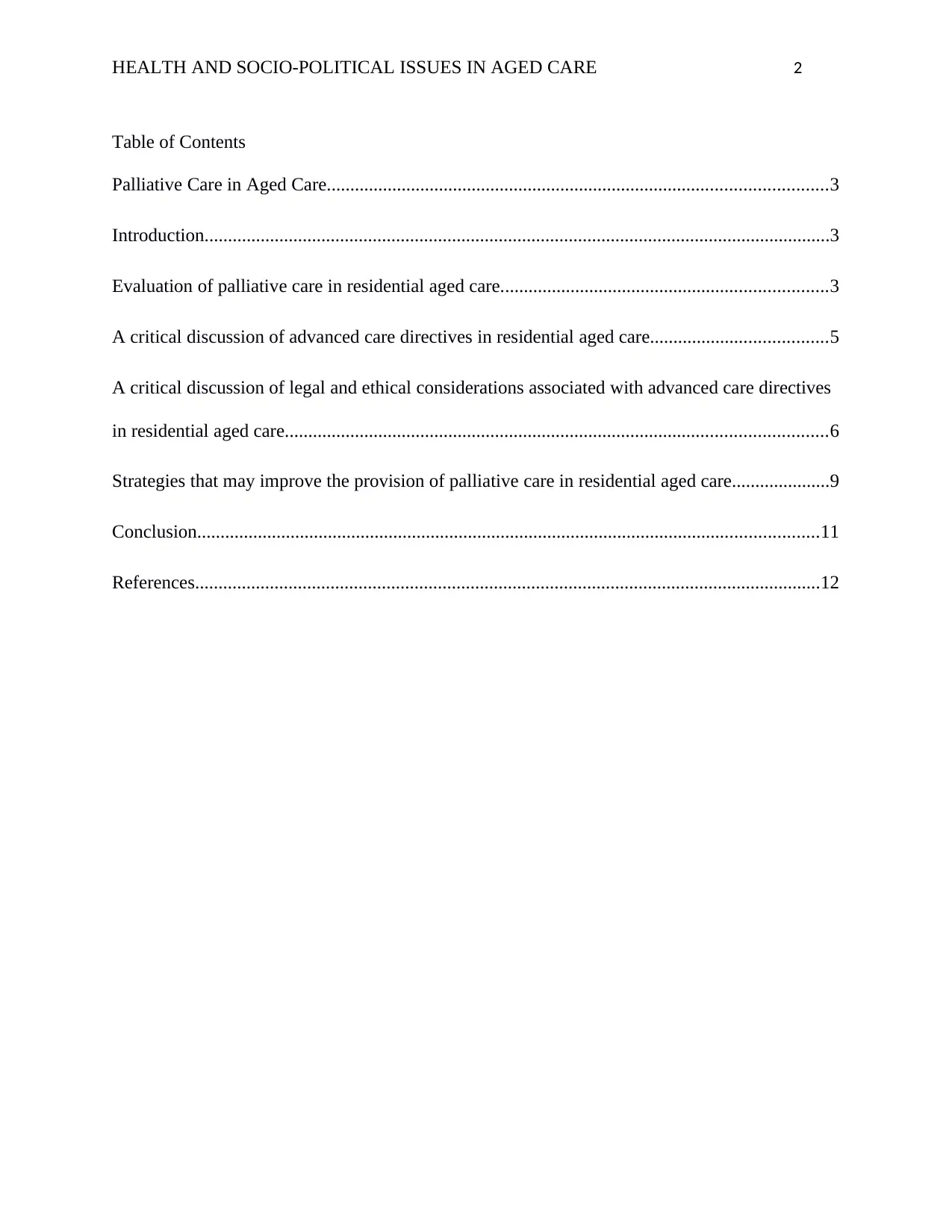
HEALTH AND SOCIO-POLITICAL ISSUES IN AGED CARE 2
Table of Contents
Palliative Care in Aged Care...........................................................................................................3
Introduction......................................................................................................................................3
Evaluation of palliative care in residential aged care......................................................................3
A critical discussion of advanced care directives in residential aged care......................................5
A critical discussion of legal and ethical considerations associated with advanced care directives
in residential aged care....................................................................................................................6
Strategies that may improve the provision of palliative care in residential aged care.....................9
Conclusion.....................................................................................................................................11
References......................................................................................................................................12
Table of Contents
Palliative Care in Aged Care...........................................................................................................3
Introduction......................................................................................................................................3
Evaluation of palliative care in residential aged care......................................................................3
A critical discussion of advanced care directives in residential aged care......................................5
A critical discussion of legal and ethical considerations associated with advanced care directives
in residential aged care....................................................................................................................6
Strategies that may improve the provision of palliative care in residential aged care.....................9
Conclusion.....................................................................................................................................11
References......................................................................................................................................12
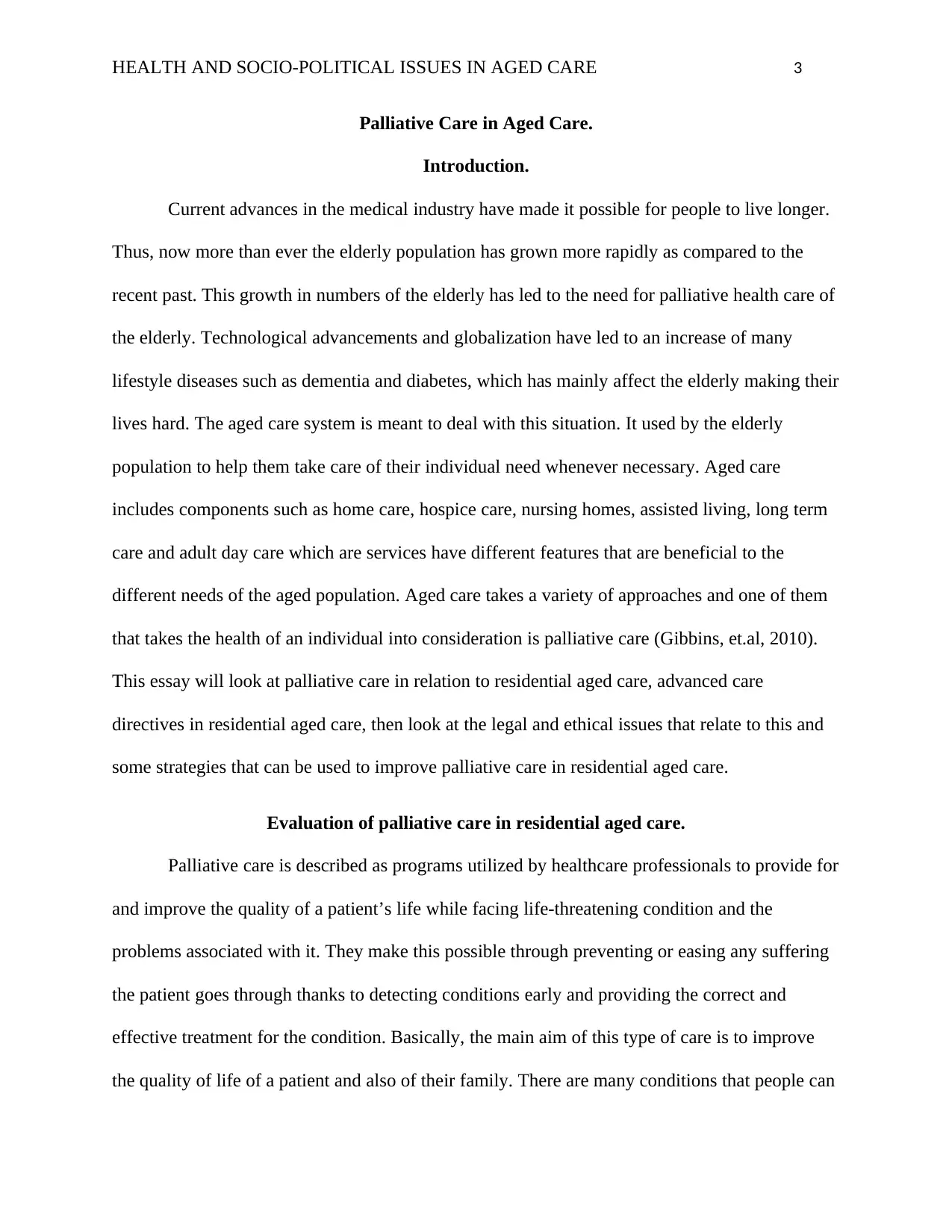
HEALTH AND SOCIO-POLITICAL ISSUES IN AGED CARE 3
Palliative Care in Aged Care.
Introduction.
Current advances in the medical industry have made it possible for people to live longer.
Thus, now more than ever the elderly population has grown more rapidly as compared to the
recent past. This growth in numbers of the elderly has led to the need for palliative health care of
the elderly. Technological advancements and globalization have led to an increase of many
lifestyle diseases such as dementia and diabetes, which has mainly affect the elderly making their
lives hard. The aged care system is meant to deal with this situation. It used by the elderly
population to help them take care of their individual need whenever necessary. Aged care
includes components such as home care, hospice care, nursing homes, assisted living, long term
care and adult day care which are services have different features that are beneficial to the
different needs of the aged population. Aged care takes a variety of approaches and one of them
that takes the health of an individual into consideration is palliative care (Gibbins, et.al, 2010).
This essay will look at palliative care in relation to residential aged care, advanced care
directives in residential aged care, then look at the legal and ethical issues that relate to this and
some strategies that can be used to improve palliative care in residential aged care.
Evaluation of palliative care in residential aged care.
Palliative care is described as programs utilized by healthcare professionals to provide for
and improve the quality of a patient’s life while facing life-threatening condition and the
problems associated with it. They make this possible through preventing or easing any suffering
the patient goes through thanks to detecting conditions early and providing the correct and
effective treatment for the condition. Basically, the main aim of this type of care is to improve
the quality of life of a patient and also of their family. There are many conditions that people can
Palliative Care in Aged Care.
Introduction.
Current advances in the medical industry have made it possible for people to live longer.
Thus, now more than ever the elderly population has grown more rapidly as compared to the
recent past. This growth in numbers of the elderly has led to the need for palliative health care of
the elderly. Technological advancements and globalization have led to an increase of many
lifestyle diseases such as dementia and diabetes, which has mainly affect the elderly making their
lives hard. The aged care system is meant to deal with this situation. It used by the elderly
population to help them take care of their individual need whenever necessary. Aged care
includes components such as home care, hospice care, nursing homes, assisted living, long term
care and adult day care which are services have different features that are beneficial to the
different needs of the aged population. Aged care takes a variety of approaches and one of them
that takes the health of an individual into consideration is palliative care (Gibbins, et.al, 2010).
This essay will look at palliative care in relation to residential aged care, advanced care
directives in residential aged care, then look at the legal and ethical issues that relate to this and
some strategies that can be used to improve palliative care in residential aged care.
Evaluation of palliative care in residential aged care.
Palliative care is described as programs utilized by healthcare professionals to provide for
and improve the quality of a patient’s life while facing life-threatening condition and the
problems associated with it. They make this possible through preventing or easing any suffering
the patient goes through thanks to detecting conditions early and providing the correct and
effective treatment for the condition. Basically, the main aim of this type of care is to improve
the quality of life of a patient and also of their family. There are many conditions that people can
⊘ This is a preview!⊘
Do you want full access?
Subscribe today to unlock all pages.

Trusted by 1+ million students worldwide
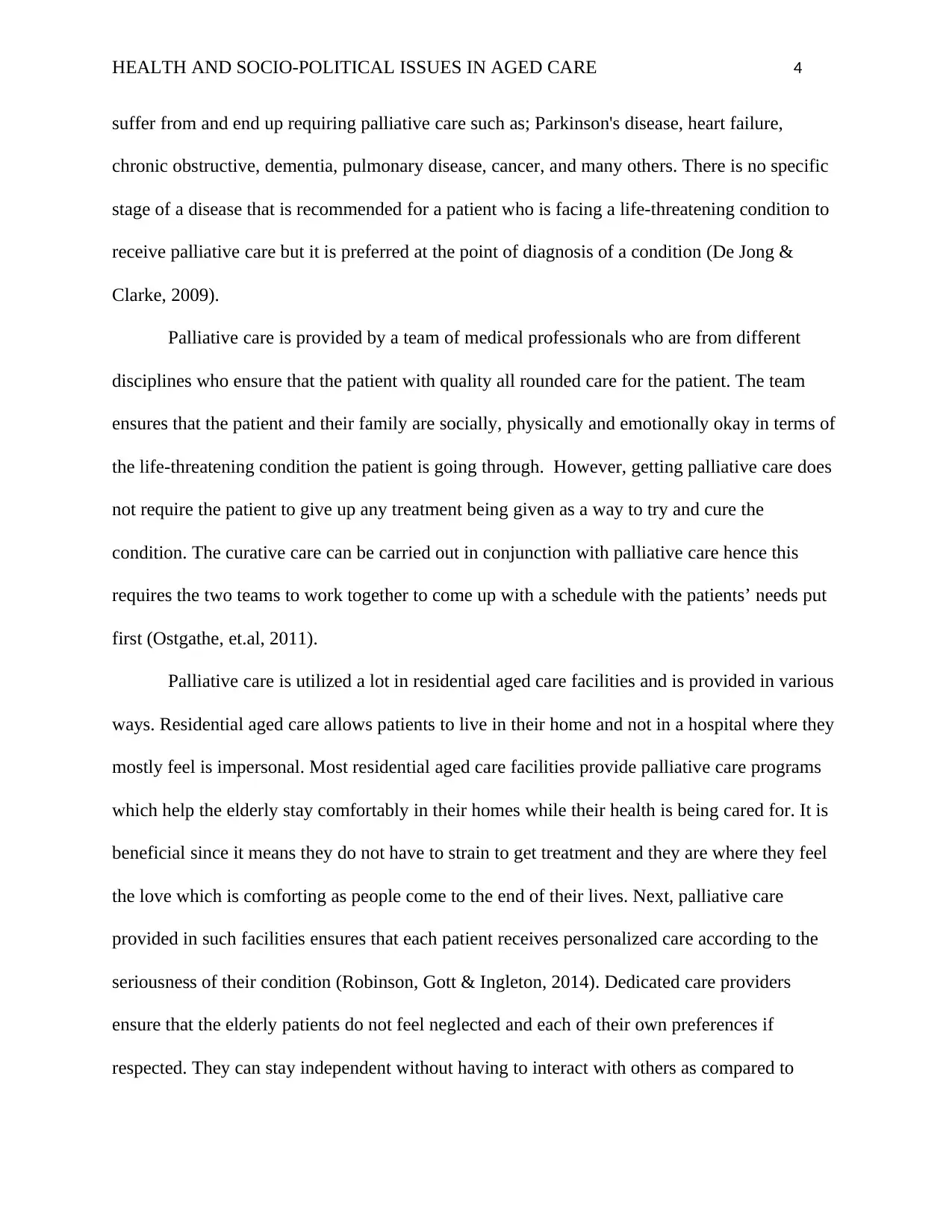
HEALTH AND SOCIO-POLITICAL ISSUES IN AGED CARE 4
suffer from and end up requiring palliative care such as; Parkinson's disease, heart failure,
chronic obstructive, dementia, pulmonary disease, cancer, and many others. There is no specific
stage of a disease that is recommended for a patient who is facing a life-threatening condition to
receive palliative care but it is preferred at the point of diagnosis of a condition (De Jong &
Clarke, 2009).
Palliative care is provided by a team of medical professionals who are from different
disciplines who ensure that the patient with quality all rounded care for the patient. The team
ensures that the patient and their family are socially, physically and emotionally okay in terms of
the life-threatening condition the patient is going through. However, getting palliative care does
not require the patient to give up any treatment being given as a way to try and cure the
condition. The curative care can be carried out in conjunction with palliative care hence this
requires the two teams to work together to come up with a schedule with the patients’ needs put
first (Ostgathe, et.al, 2011).
Palliative care is utilized a lot in residential aged care facilities and is provided in various
ways. Residential aged care allows patients to live in their home and not in a hospital where they
mostly feel is impersonal. Most residential aged care facilities provide palliative care programs
which help the elderly stay comfortably in their homes while their health is being cared for. It is
beneficial since it means they do not have to strain to get treatment and they are where they feel
the love which is comforting as people come to the end of their lives. Next, palliative care
provided in such facilities ensures that each patient receives personalized care according to the
seriousness of their condition (Robinson, Gott & Ingleton, 2014). Dedicated care providers
ensure that the elderly patients do not feel neglected and each of their own preferences if
respected. They can stay independent without having to interact with others as compared to
suffer from and end up requiring palliative care such as; Parkinson's disease, heart failure,
chronic obstructive, dementia, pulmonary disease, cancer, and many others. There is no specific
stage of a disease that is recommended for a patient who is facing a life-threatening condition to
receive palliative care but it is preferred at the point of diagnosis of a condition (De Jong &
Clarke, 2009).
Palliative care is provided by a team of medical professionals who are from different
disciplines who ensure that the patient with quality all rounded care for the patient. The team
ensures that the patient and their family are socially, physically and emotionally okay in terms of
the life-threatening condition the patient is going through. However, getting palliative care does
not require the patient to give up any treatment being given as a way to try and cure the
condition. The curative care can be carried out in conjunction with palliative care hence this
requires the two teams to work together to come up with a schedule with the patients’ needs put
first (Ostgathe, et.al, 2011).
Palliative care is utilized a lot in residential aged care facilities and is provided in various
ways. Residential aged care allows patients to live in their home and not in a hospital where they
mostly feel is impersonal. Most residential aged care facilities provide palliative care programs
which help the elderly stay comfortably in their homes while their health is being cared for. It is
beneficial since it means they do not have to strain to get treatment and they are where they feel
the love which is comforting as people come to the end of their lives. Next, palliative care
provided in such facilities ensures that each patient receives personalized care according to the
seriousness of their condition (Robinson, Gott & Ingleton, 2014). Dedicated care providers
ensure that the elderly patients do not feel neglected and each of their own preferences if
respected. They can stay independent without having to interact with others as compared to
Paraphrase This Document
Need a fresh take? Get an instant paraphrase of this document with our AI Paraphraser
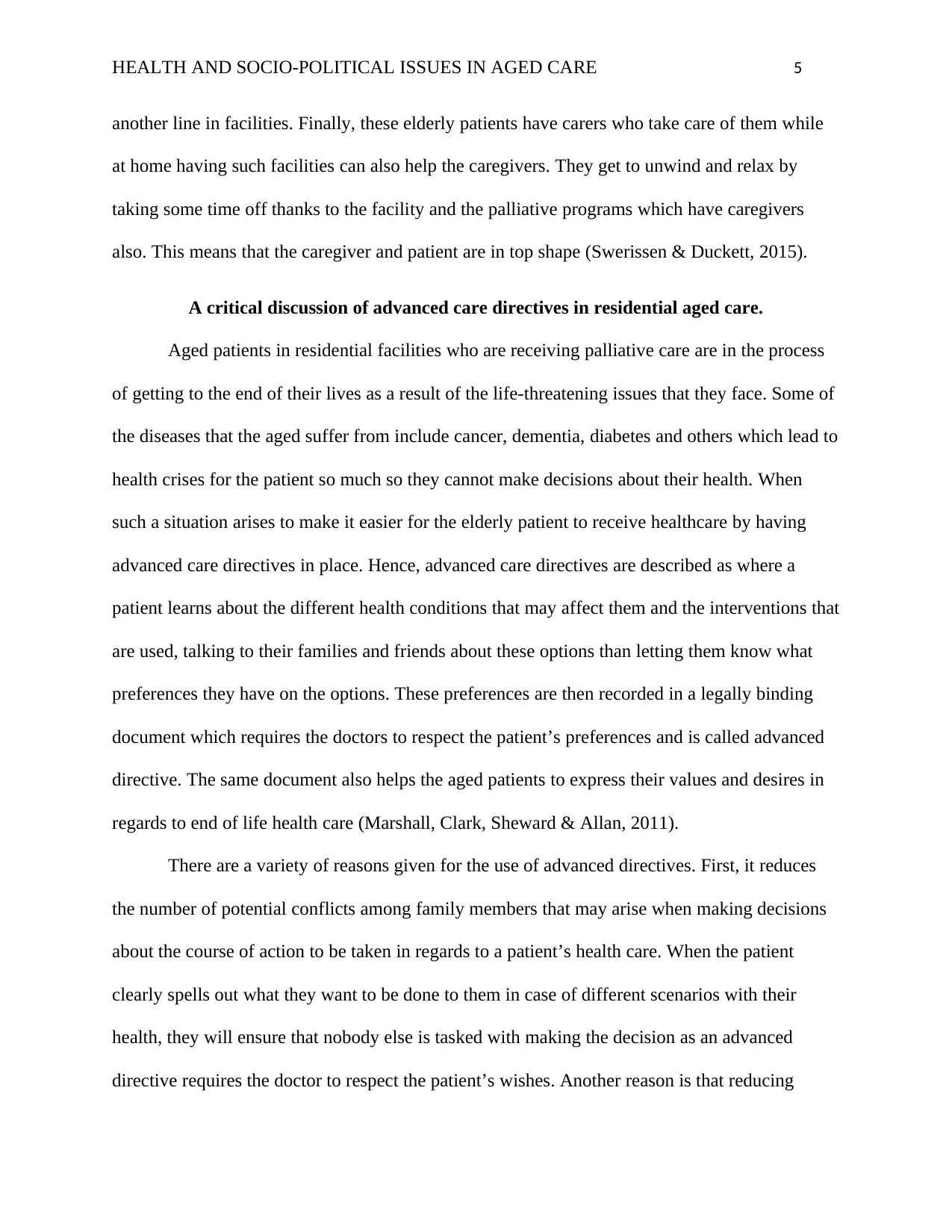
HEALTH AND SOCIO-POLITICAL ISSUES IN AGED CARE 5
another line in facilities. Finally, these elderly patients have carers who take care of them while
at home having such facilities can also help the caregivers. They get to unwind and relax by
taking some time off thanks to the facility and the palliative programs which have caregivers
also. This means that the caregiver and patient are in top shape (Swerissen & Duckett, 2015).
A critical discussion of advanced care directives in residential aged care.
Aged patients in residential facilities who are receiving palliative care are in the process
of getting to the end of their lives as a result of the life-threatening issues that they face. Some of
the diseases that the aged suffer from include cancer, dementia, diabetes and others which lead to
health crises for the patient so much so they cannot make decisions about their health. When
such a situation arises to make it easier for the elderly patient to receive healthcare by having
advanced care directives in place. Hence, advanced care directives are described as where a
patient learns about the different health conditions that may affect them and the interventions that
are used, talking to their families and friends about these options than letting them know what
preferences they have on the options. These preferences are then recorded in a legally binding
document which requires the doctors to respect the patient’s preferences and is called advanced
directive. The same document also helps the aged patients to express their values and desires in
regards to end of life health care (Marshall, Clark, Sheward & Allan, 2011).
There are a variety of reasons given for the use of advanced directives. First, it reduces
the number of potential conflicts among family members that may arise when making decisions
about the course of action to be taken in regards to a patient’s health care. When the patient
clearly spells out what they want to be done to them in case of different scenarios with their
health, they will ensure that nobody else is tasked with making the decision as an advanced
directive requires the doctor to respect the patient’s wishes. Another reason is that reducing
another line in facilities. Finally, these elderly patients have carers who take care of them while
at home having such facilities can also help the caregivers. They get to unwind and relax by
taking some time off thanks to the facility and the palliative programs which have caregivers
also. This means that the caregiver and patient are in top shape (Swerissen & Duckett, 2015).
A critical discussion of advanced care directives in residential aged care.
Aged patients in residential facilities who are receiving palliative care are in the process
of getting to the end of their lives as a result of the life-threatening issues that they face. Some of
the diseases that the aged suffer from include cancer, dementia, diabetes and others which lead to
health crises for the patient so much so they cannot make decisions about their health. When
such a situation arises to make it easier for the elderly patient to receive healthcare by having
advanced care directives in place. Hence, advanced care directives are described as where a
patient learns about the different health conditions that may affect them and the interventions that
are used, talking to their families and friends about these options than letting them know what
preferences they have on the options. These preferences are then recorded in a legally binding
document which requires the doctors to respect the patient’s preferences and is called advanced
directive. The same document also helps the aged patients to express their values and desires in
regards to end of life health care (Marshall, Clark, Sheward & Allan, 2011).
There are a variety of reasons given for the use of advanced directives. First, it reduces
the number of potential conflicts among family members that may arise when making decisions
about the course of action to be taken in regards to a patient’s health care. When the patient
clearly spells out what they want to be done to them in case of different scenarios with their
health, they will ensure that nobody else is tasked with making the decision as an advanced
directive requires the doctor to respect the patient’s wishes. Another reason is that reducing
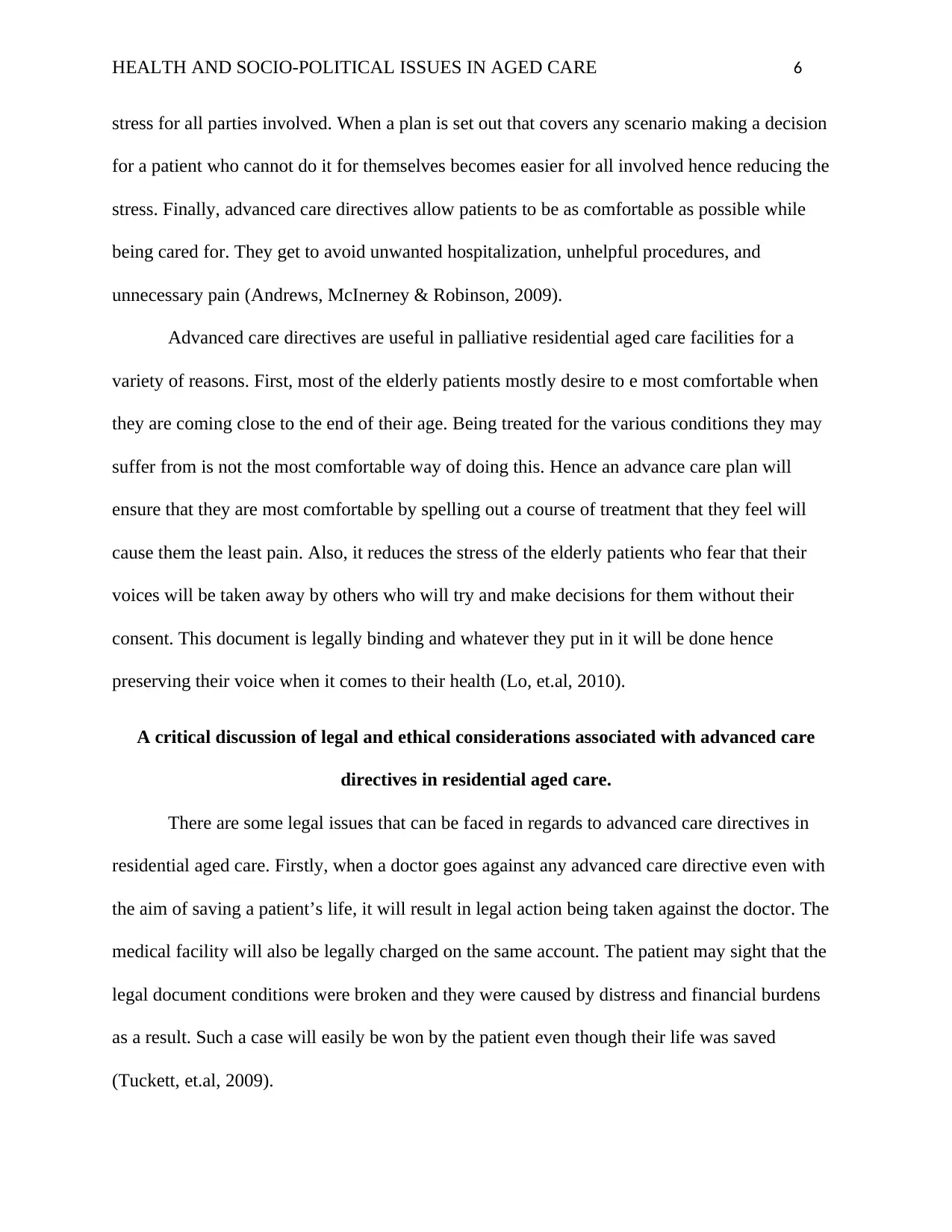
HEALTH AND SOCIO-POLITICAL ISSUES IN AGED CARE 6
stress for all parties involved. When a plan is set out that covers any scenario making a decision
for a patient who cannot do it for themselves becomes easier for all involved hence reducing the
stress. Finally, advanced care directives allow patients to be as comfortable as possible while
being cared for. They get to avoid unwanted hospitalization, unhelpful procedures, and
unnecessary pain (Andrews, McInerney & Robinson, 2009).
Advanced care directives are useful in palliative residential aged care facilities for a
variety of reasons. First, most of the elderly patients mostly desire to e most comfortable when
they are coming close to the end of their age. Being treated for the various conditions they may
suffer from is not the most comfortable way of doing this. Hence an advance care plan will
ensure that they are most comfortable by spelling out a course of treatment that they feel will
cause them the least pain. Also, it reduces the stress of the elderly patients who fear that their
voices will be taken away by others who will try and make decisions for them without their
consent. This document is legally binding and whatever they put in it will be done hence
preserving their voice when it comes to their health (Lo, et.al, 2010).
A critical discussion of legal and ethical considerations associated with advanced care
directives in residential aged care.
There are some legal issues that can be faced in regards to advanced care directives in
residential aged care. Firstly, when a doctor goes against any advanced care directive even with
the aim of saving a patient’s life, it will result in legal action being taken against the doctor. The
medical facility will also be legally charged on the same account. The patient may sight that the
legal document conditions were broken and they were caused by distress and financial burdens
as a result. Such a case will easily be won by the patient even though their life was saved
(Tuckett, et.al, 2009).
stress for all parties involved. When a plan is set out that covers any scenario making a decision
for a patient who cannot do it for themselves becomes easier for all involved hence reducing the
stress. Finally, advanced care directives allow patients to be as comfortable as possible while
being cared for. They get to avoid unwanted hospitalization, unhelpful procedures, and
unnecessary pain (Andrews, McInerney & Robinson, 2009).
Advanced care directives are useful in palliative residential aged care facilities for a
variety of reasons. First, most of the elderly patients mostly desire to e most comfortable when
they are coming close to the end of their age. Being treated for the various conditions they may
suffer from is not the most comfortable way of doing this. Hence an advance care plan will
ensure that they are most comfortable by spelling out a course of treatment that they feel will
cause them the least pain. Also, it reduces the stress of the elderly patients who fear that their
voices will be taken away by others who will try and make decisions for them without their
consent. This document is legally binding and whatever they put in it will be done hence
preserving their voice when it comes to their health (Lo, et.al, 2010).
A critical discussion of legal and ethical considerations associated with advanced care
directives in residential aged care.
There are some legal issues that can be faced in regards to advanced care directives in
residential aged care. Firstly, when a doctor goes against any advanced care directive even with
the aim of saving a patient’s life, it will result in legal action being taken against the doctor. The
medical facility will also be legally charged on the same account. The patient may sight that the
legal document conditions were broken and they were caused by distress and financial burdens
as a result. Such a case will easily be won by the patient even though their life was saved
(Tuckett, et.al, 2009).
⊘ This is a preview!⊘
Do you want full access?
Subscribe today to unlock all pages.

Trusted by 1+ million students worldwide
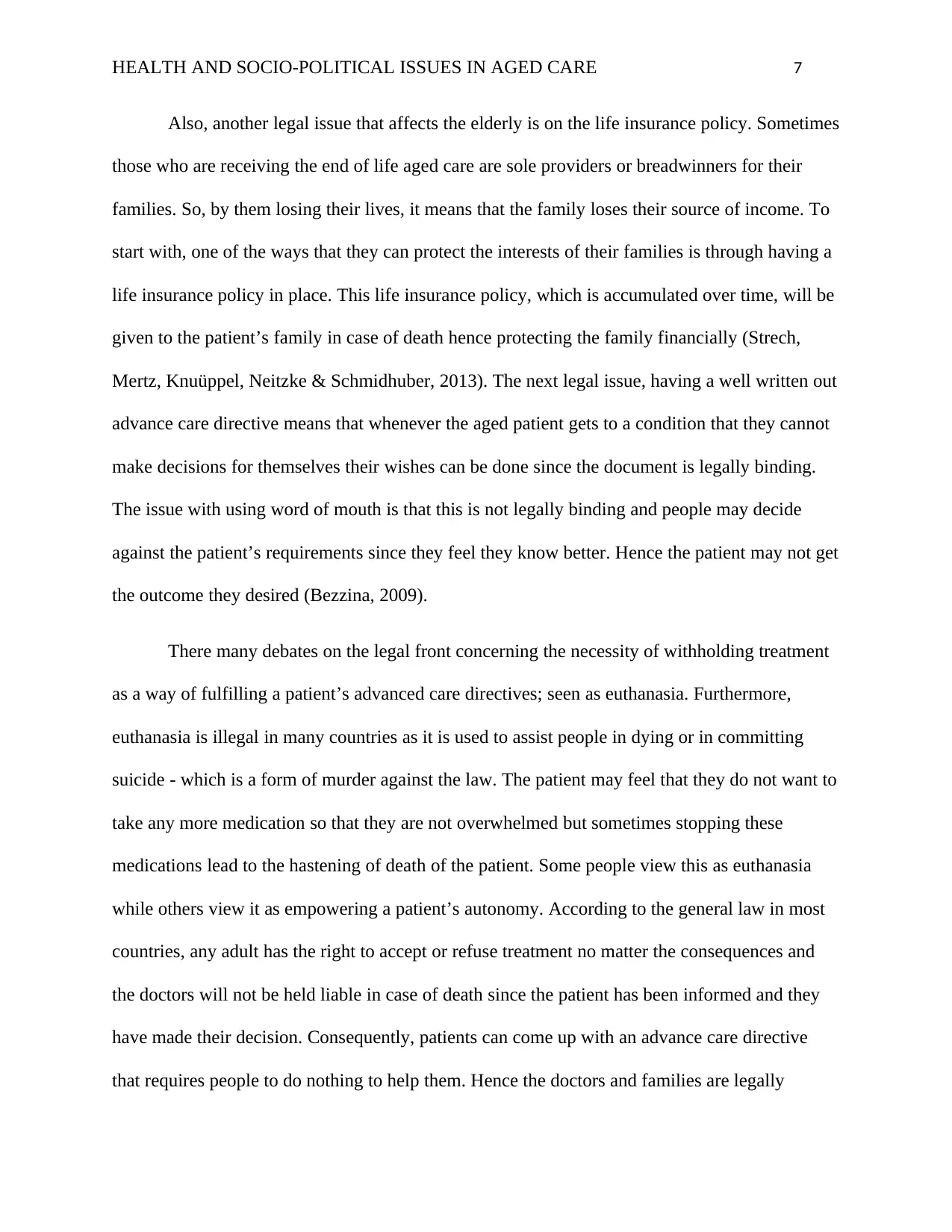
HEALTH AND SOCIO-POLITICAL ISSUES IN AGED CARE 7
Also, another legal issue that affects the elderly is on the life insurance policy. Sometimes
those who are receiving the end of life aged care are sole providers or breadwinners for their
families. So, by them losing their lives, it means that the family loses their source of income. To
start with, one of the ways that they can protect the interests of their families is through having a
life insurance policy in place. This life insurance policy, which is accumulated over time, will be
given to the patient’s family in case of death hence protecting the family financially (Strech,
Mertz, Knuüppel, Neitzke & Schmidhuber, 2013). The next legal issue, having a well written out
advance care directive means that whenever the aged patient gets to a condition that they cannot
make decisions for themselves their wishes can be done since the document is legally binding.
The issue with using word of mouth is that this is not legally binding and people may decide
against the patient’s requirements since they feel they know better. Hence the patient may not get
the outcome they desired (Bezzina, 2009).
There many debates on the legal front concerning the necessity of withholding treatment
as a way of fulfilling a patient’s advanced care directives; seen as euthanasia. Furthermore,
euthanasia is illegal in many countries as it is used to assist people in dying or in committing
suicide - which is a form of murder against the law. The patient may feel that they do not want to
take any more medication so that they are not overwhelmed but sometimes stopping these
medications lead to the hastening of death of the patient. Some people view this as euthanasia
while others view it as empowering a patient’s autonomy. According to the general law in most
countries, any adult has the right to accept or refuse treatment no matter the consequences and
the doctors will not be held liable in case of death since the patient has been informed and they
have made their decision. Consequently, patients can come up with an advance care directive
that requires people to do nothing to help them. Hence the doctors and families are legally
Also, another legal issue that affects the elderly is on the life insurance policy. Sometimes
those who are receiving the end of life aged care are sole providers or breadwinners for their
families. So, by them losing their lives, it means that the family loses their source of income. To
start with, one of the ways that they can protect the interests of their families is through having a
life insurance policy in place. This life insurance policy, which is accumulated over time, will be
given to the patient’s family in case of death hence protecting the family financially (Strech,
Mertz, Knuüppel, Neitzke & Schmidhuber, 2013). The next legal issue, having a well written out
advance care directive means that whenever the aged patient gets to a condition that they cannot
make decisions for themselves their wishes can be done since the document is legally binding.
The issue with using word of mouth is that this is not legally binding and people may decide
against the patient’s requirements since they feel they know better. Hence the patient may not get
the outcome they desired (Bezzina, 2009).
There many debates on the legal front concerning the necessity of withholding treatment
as a way of fulfilling a patient’s advanced care directives; seen as euthanasia. Furthermore,
euthanasia is illegal in many countries as it is used to assist people in dying or in committing
suicide - which is a form of murder against the law. The patient may feel that they do not want to
take any more medication so that they are not overwhelmed but sometimes stopping these
medications lead to the hastening of death of the patient. Some people view this as euthanasia
while others view it as empowering a patient’s autonomy. According to the general law in most
countries, any adult has the right to accept or refuse treatment no matter the consequences and
the doctors will not be held liable in case of death since the patient has been informed and they
have made their decision. Consequently, patients can come up with an advance care directive
that requires people to do nothing to help them. Hence the doctors and families are legally
Paraphrase This Document
Need a fresh take? Get an instant paraphrase of this document with our AI Paraphraser
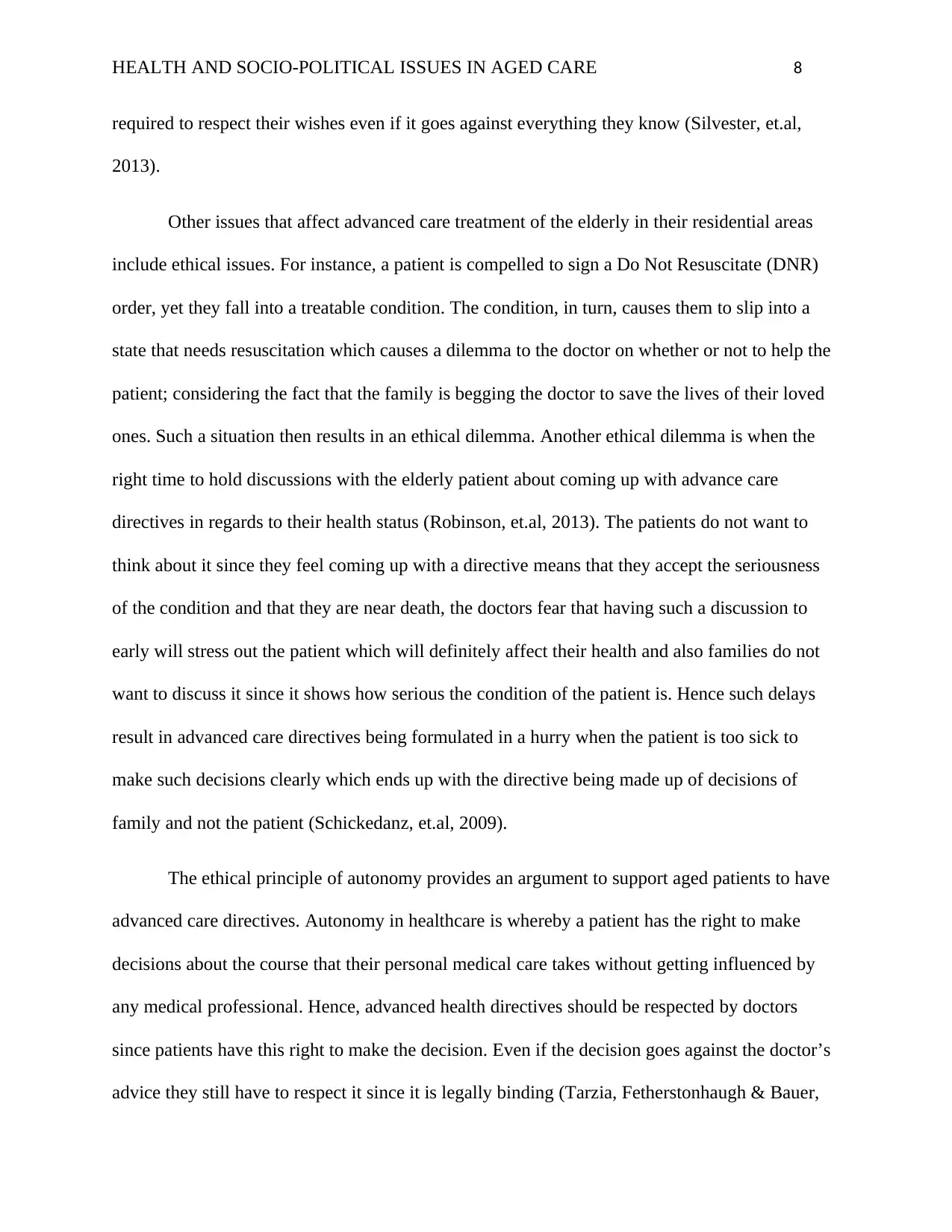
HEALTH AND SOCIO-POLITICAL ISSUES IN AGED CARE 8
required to respect their wishes even if it goes against everything they know (Silvester, et.al,
2013).
Other issues that affect advanced care treatment of the elderly in their residential areas
include ethical issues. For instance, a patient is compelled to sign a Do Not Resuscitate (DNR)
order, yet they fall into a treatable condition. The condition, in turn, causes them to slip into a
state that needs resuscitation which causes a dilemma to the doctor on whether or not to help the
patient; considering the fact that the family is begging the doctor to save the lives of their loved
ones. Such a situation then results in an ethical dilemma. Another ethical dilemma is when the
right time to hold discussions with the elderly patient about coming up with advance care
directives in regards to their health status (Robinson, et.al, 2013). The patients do not want to
think about it since they feel coming up with a directive means that they accept the seriousness
of the condition and that they are near death, the doctors fear that having such a discussion to
early will stress out the patient which will definitely affect their health and also families do not
want to discuss it since it shows how serious the condition of the patient is. Hence such delays
result in advanced care directives being formulated in a hurry when the patient is too sick to
make such decisions clearly which ends up with the directive being made up of decisions of
family and not the patient (Schickedanz, et.al, 2009).
The ethical principle of autonomy provides an argument to support aged patients to have
advanced care directives. Autonomy in healthcare is whereby a patient has the right to make
decisions about the course that their personal medical care takes without getting influenced by
any medical professional. Hence, advanced health directives should be respected by doctors
since patients have this right to make the decision. Even if the decision goes against the doctor’s
advice they still have to respect it since it is legally binding (Tarzia, Fetherstonhaugh & Bauer,
required to respect their wishes even if it goes against everything they know (Silvester, et.al,
2013).
Other issues that affect advanced care treatment of the elderly in their residential areas
include ethical issues. For instance, a patient is compelled to sign a Do Not Resuscitate (DNR)
order, yet they fall into a treatable condition. The condition, in turn, causes them to slip into a
state that needs resuscitation which causes a dilemma to the doctor on whether or not to help the
patient; considering the fact that the family is begging the doctor to save the lives of their loved
ones. Such a situation then results in an ethical dilemma. Another ethical dilemma is when the
right time to hold discussions with the elderly patient about coming up with advance care
directives in regards to their health status (Robinson, et.al, 2013). The patients do not want to
think about it since they feel coming up with a directive means that they accept the seriousness
of the condition and that they are near death, the doctors fear that having such a discussion to
early will stress out the patient which will definitely affect their health and also families do not
want to discuss it since it shows how serious the condition of the patient is. Hence such delays
result in advanced care directives being formulated in a hurry when the patient is too sick to
make such decisions clearly which ends up with the directive being made up of decisions of
family and not the patient (Schickedanz, et.al, 2009).
The ethical principle of autonomy provides an argument to support aged patients to have
advanced care directives. Autonomy in healthcare is whereby a patient has the right to make
decisions about the course that their personal medical care takes without getting influenced by
any medical professional. Hence, advanced health directives should be respected by doctors
since patients have this right to make the decision. Even if the decision goes against the doctor’s
advice they still have to respect it since it is legally binding (Tarzia, Fetherstonhaugh & Bauer,
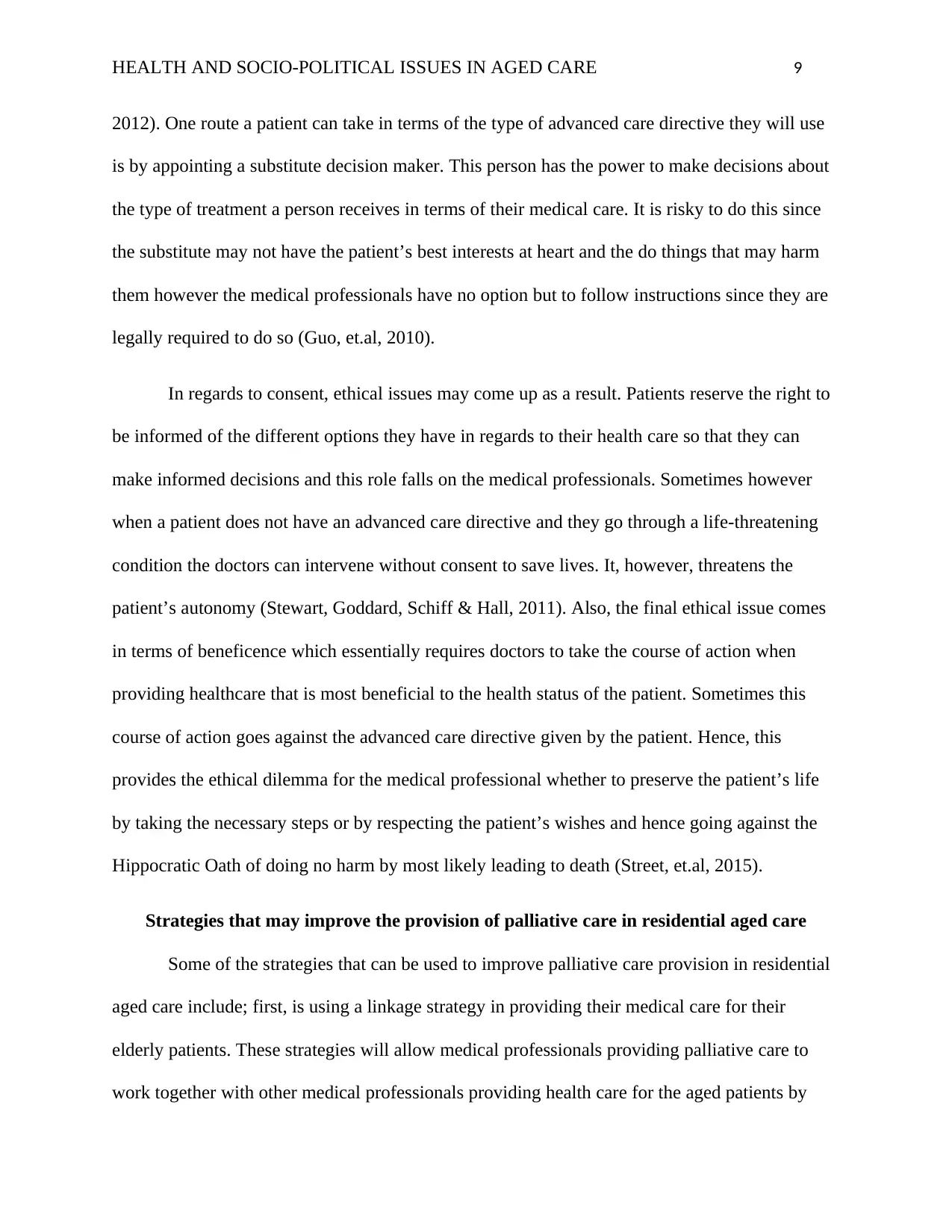
HEALTH AND SOCIO-POLITICAL ISSUES IN AGED CARE 9
2012). One route a patient can take in terms of the type of advanced care directive they will use
is by appointing a substitute decision maker. This person has the power to make decisions about
the type of treatment a person receives in terms of their medical care. It is risky to do this since
the substitute may not have the patient’s best interests at heart and the do things that may harm
them however the medical professionals have no option but to follow instructions since they are
legally required to do so (Guo, et.al, 2010).
In regards to consent, ethical issues may come up as a result. Patients reserve the right to
be informed of the different options they have in regards to their health care so that they can
make informed decisions and this role falls on the medical professionals. Sometimes however
when a patient does not have an advanced care directive and they go through a life-threatening
condition the doctors can intervene without consent to save lives. It, however, threatens the
patient’s autonomy (Stewart, Goddard, Schiff & Hall, 2011). Also, the final ethical issue comes
in terms of beneficence which essentially requires doctors to take the course of action when
providing healthcare that is most beneficial to the health status of the patient. Sometimes this
course of action goes against the advanced care directive given by the patient. Hence, this
provides the ethical dilemma for the medical professional whether to preserve the patient’s life
by taking the necessary steps or by respecting the patient’s wishes and hence going against the
Hippocratic Oath of doing no harm by most likely leading to death (Street, et.al, 2015).
Strategies that may improve the provision of palliative care in residential aged care
Some of the strategies that can be used to improve palliative care provision in residential
aged care include; first, is using a linkage strategy in providing their medical care for their
elderly patients. These strategies will allow medical professionals providing palliative care to
work together with other medical professionals providing health care for the aged patients by
2012). One route a patient can take in terms of the type of advanced care directive they will use
is by appointing a substitute decision maker. This person has the power to make decisions about
the type of treatment a person receives in terms of their medical care. It is risky to do this since
the substitute may not have the patient’s best interests at heart and the do things that may harm
them however the medical professionals have no option but to follow instructions since they are
legally required to do so (Guo, et.al, 2010).
In regards to consent, ethical issues may come up as a result. Patients reserve the right to
be informed of the different options they have in regards to their health care so that they can
make informed decisions and this role falls on the medical professionals. Sometimes however
when a patient does not have an advanced care directive and they go through a life-threatening
condition the doctors can intervene without consent to save lives. It, however, threatens the
patient’s autonomy (Stewart, Goddard, Schiff & Hall, 2011). Also, the final ethical issue comes
in terms of beneficence which essentially requires doctors to take the course of action when
providing healthcare that is most beneficial to the health status of the patient. Sometimes this
course of action goes against the advanced care directive given by the patient. Hence, this
provides the ethical dilemma for the medical professional whether to preserve the patient’s life
by taking the necessary steps or by respecting the patient’s wishes and hence going against the
Hippocratic Oath of doing no harm by most likely leading to death (Street, et.al, 2015).
Strategies that may improve the provision of palliative care in residential aged care
Some of the strategies that can be used to improve palliative care provision in residential
aged care include; first, is using a linkage strategy in providing their medical care for their
elderly patients. These strategies will allow medical professionals providing palliative care to
work together with other medical professionals providing health care for the aged patients by
⊘ This is a preview!⊘
Do you want full access?
Subscribe today to unlock all pages.

Trusted by 1+ million students worldwide
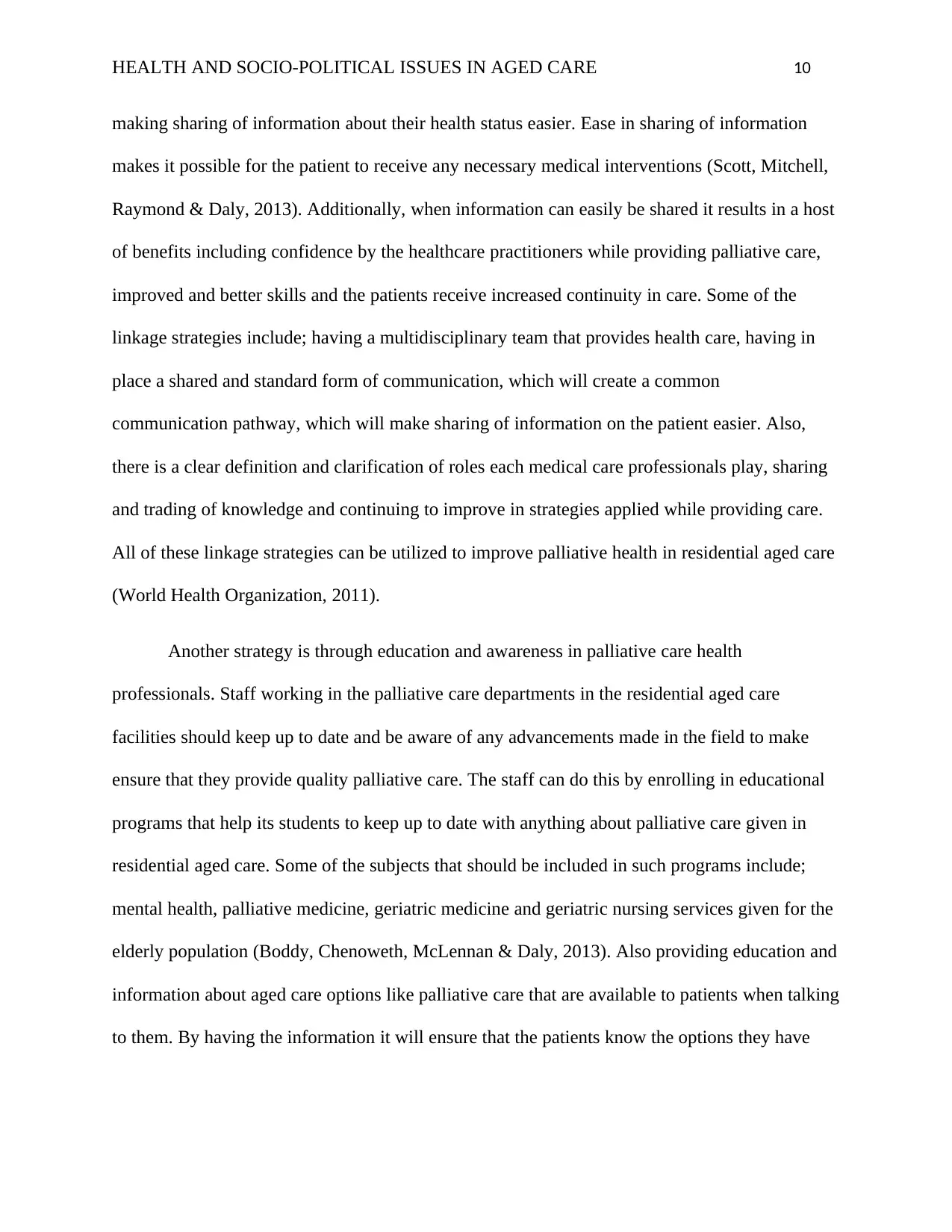
HEALTH AND SOCIO-POLITICAL ISSUES IN AGED CARE 10
making sharing of information about their health status easier. Ease in sharing of information
makes it possible for the patient to receive any necessary medical interventions (Scott, Mitchell,
Raymond & Daly, 2013). Additionally, when information can easily be shared it results in a host
of benefits including confidence by the healthcare practitioners while providing palliative care,
improved and better skills and the patients receive increased continuity in care. Some of the
linkage strategies include; having a multidisciplinary team that provides health care, having in
place a shared and standard form of communication, which will create a common
communication pathway, which will make sharing of information on the patient easier. Also,
there is a clear definition and clarification of roles each medical care professionals play, sharing
and trading of knowledge and continuing to improve in strategies applied while providing care.
All of these linkage strategies can be utilized to improve palliative health in residential aged care
(World Health Organization, 2011).
Another strategy is through education and awareness in palliative care health
professionals. Staff working in the palliative care departments in the residential aged care
facilities should keep up to date and be aware of any advancements made in the field to make
ensure that they provide quality palliative care. The staff can do this by enrolling in educational
programs that help its students to keep up to date with anything about palliative care given in
residential aged care. Some of the subjects that should be included in such programs include;
mental health, palliative medicine, geriatric medicine and geriatric nursing services given for the
elderly population (Boddy, Chenoweth, McLennan & Daly, 2013). Also providing education and
information about aged care options like palliative care that are available to patients when talking
to them. By having the information it will ensure that the patients know the options they have
making sharing of information about their health status easier. Ease in sharing of information
makes it possible for the patient to receive any necessary medical interventions (Scott, Mitchell,
Raymond & Daly, 2013). Additionally, when information can easily be shared it results in a host
of benefits including confidence by the healthcare practitioners while providing palliative care,
improved and better skills and the patients receive increased continuity in care. Some of the
linkage strategies include; having a multidisciplinary team that provides health care, having in
place a shared and standard form of communication, which will create a common
communication pathway, which will make sharing of information on the patient easier. Also,
there is a clear definition and clarification of roles each medical care professionals play, sharing
and trading of knowledge and continuing to improve in strategies applied while providing care.
All of these linkage strategies can be utilized to improve palliative health in residential aged care
(World Health Organization, 2011).
Another strategy is through education and awareness in palliative care health
professionals. Staff working in the palliative care departments in the residential aged care
facilities should keep up to date and be aware of any advancements made in the field to make
ensure that they provide quality palliative care. The staff can do this by enrolling in educational
programs that help its students to keep up to date with anything about palliative care given in
residential aged care. Some of the subjects that should be included in such programs include;
mental health, palliative medicine, geriatric medicine and geriatric nursing services given for the
elderly population (Boddy, Chenoweth, McLennan & Daly, 2013). Also providing education and
information about aged care options like palliative care that are available to patients when talking
to them. By having the information it will ensure that the patients know the options they have
Paraphrase This Document
Need a fresh take? Get an instant paraphrase of this document with our AI Paraphraser
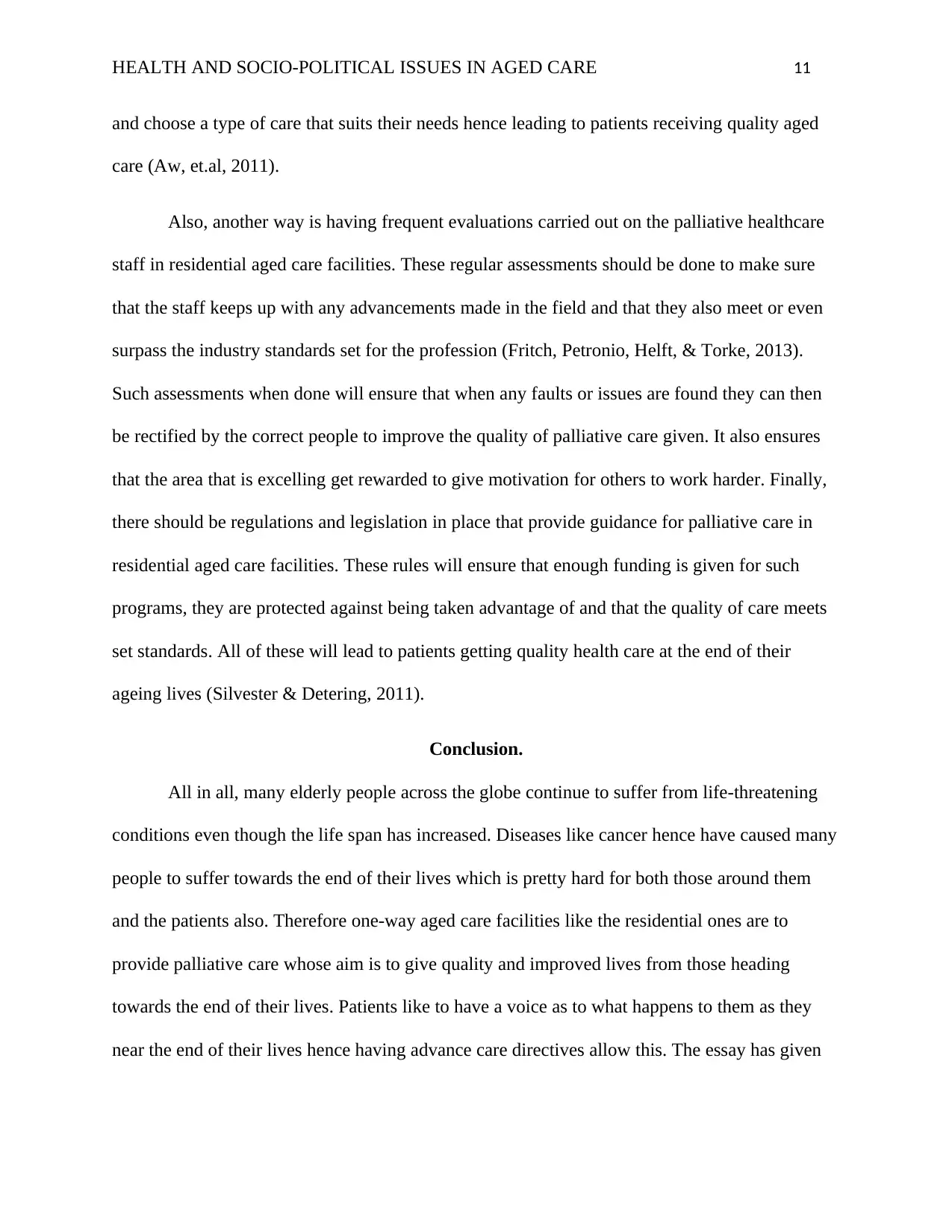
HEALTH AND SOCIO-POLITICAL ISSUES IN AGED CARE 11
and choose a type of care that suits their needs hence leading to patients receiving quality aged
care (Aw, et.al, 2011).
Also, another way is having frequent evaluations carried out on the palliative healthcare
staff in residential aged care facilities. These regular assessments should be done to make sure
that the staff keeps up with any advancements made in the field and that they also meet or even
surpass the industry standards set for the profession (Fritch, Petronio, Helft, & Torke, 2013).
Such assessments when done will ensure that when any faults or issues are found they can then
be rectified by the correct people to improve the quality of palliative care given. It also ensures
that the area that is excelling get rewarded to give motivation for others to work harder. Finally,
there should be regulations and legislation in place that provide guidance for palliative care in
residential aged care facilities. These rules will ensure that enough funding is given for such
programs, they are protected against being taken advantage of and that the quality of care meets
set standards. All of these will lead to patients getting quality health care at the end of their
ageing lives (Silvester & Detering, 2011).
Conclusion.
All in all, many elderly people across the globe continue to suffer from life-threatening
conditions even though the life span has increased. Diseases like cancer hence have caused many
people to suffer towards the end of their lives which is pretty hard for both those around them
and the patients also. Therefore one-way aged care facilities like the residential ones are to
provide palliative care whose aim is to give quality and improved lives from those heading
towards the end of their lives. Patients like to have a voice as to what happens to them as they
near the end of their lives hence having advance care directives allow this. The essay has given
and choose a type of care that suits their needs hence leading to patients receiving quality aged
care (Aw, et.al, 2011).
Also, another way is having frequent evaluations carried out on the palliative healthcare
staff in residential aged care facilities. These regular assessments should be done to make sure
that the staff keeps up with any advancements made in the field and that they also meet or even
surpass the industry standards set for the profession (Fritch, Petronio, Helft, & Torke, 2013).
Such assessments when done will ensure that when any faults or issues are found they can then
be rectified by the correct people to improve the quality of palliative care given. It also ensures
that the area that is excelling get rewarded to give motivation for others to work harder. Finally,
there should be regulations and legislation in place that provide guidance for palliative care in
residential aged care facilities. These rules will ensure that enough funding is given for such
programs, they are protected against being taken advantage of and that the quality of care meets
set standards. All of these will lead to patients getting quality health care at the end of their
ageing lives (Silvester & Detering, 2011).
Conclusion.
All in all, many elderly people across the globe continue to suffer from life-threatening
conditions even though the life span has increased. Diseases like cancer hence have caused many
people to suffer towards the end of their lives which is pretty hard for both those around them
and the patients also. Therefore one-way aged care facilities like the residential ones are to
provide palliative care whose aim is to give quality and improved lives from those heading
towards the end of their lives. Patients like to have a voice as to what happens to them as they
near the end of their lives hence having advance care directives allow this. The essay has given

HEALTH AND SOCIO-POLITICAL ISSUES IN AGED CARE 12
strategies which can be applied in residential aged care facilities who also provide palliative care
for the patients.
strategies which can be applied in residential aged care facilities who also provide palliative care
for the patients.
⊘ This is a preview!⊘
Do you want full access?
Subscribe today to unlock all pages.

Trusted by 1+ million students worldwide
1 out of 16
Related Documents
Your All-in-One AI-Powered Toolkit for Academic Success.
+13062052269
info@desklib.com
Available 24*7 on WhatsApp / Email
![[object Object]](/_next/static/media/star-bottom.7253800d.svg)
Unlock your academic potential
Copyright © 2020–2026 A2Z Services. All Rights Reserved. Developed and managed by ZUCOL.





